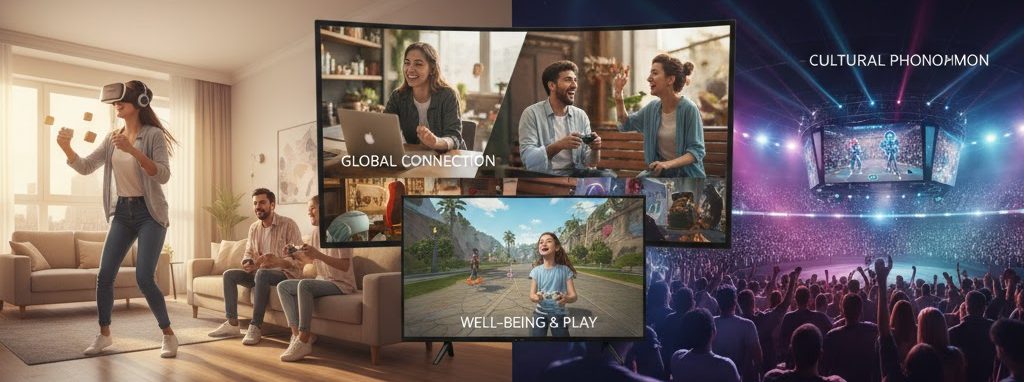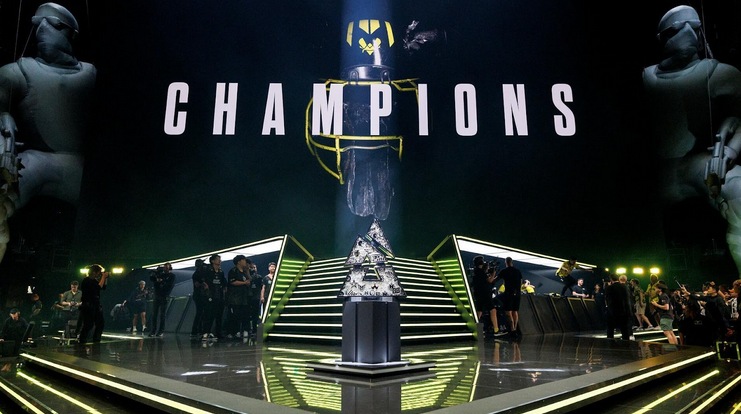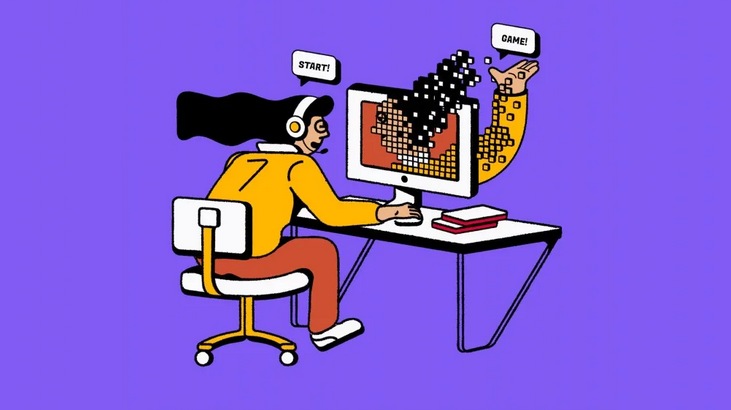Blog
How Gaming Shapes Modern Lifestyles and Daily Routines

The world is changing faster than ever, and with it, our understanding of leisure, creativity, and connection is evolving. Video games, once dismissed as a childish distraction, have grown into a global force that shapes how we live, communicate, and even work. They’ve become an art form, a social network, and for millions — a daily ritual. Gaming today is not just about pixels and points; it’s about people, passion, and possibility. This article examines how games are quietly yet powerfully reshaping modern lifestyles and everyday routines.
Cultural Shift: From Hobby to Daily Habit

- Not so long ago, gaming was something you did for fun after school. Now it’s a cultural movement that rivals movies and music in influence. Major tournaments like the cs major draw millions of viewers worldwide, with fans cheering as if watching the Champions League. Professional players have coaches, sponsorships, and fan clubs; they stream to audiences of hundreds of thousands. The energy, dedication, and teamwork are every bit as real as in traditional sports.
- But gaming isn’t just for the pros. It’s also become a shared space — a modern-day hangout. Friends no longer need to meet in the same city or even the same country; they log into the same server instead. For many, the evening “let’s play” replaces the coffee catch-up or pub night. Within these virtual worlds, people laugh, argue, support one another, and form bonds that are often deeper than those formed offline. The result is a new kind of community — one built not on geography, but on shared curiosity and joy.
- The normalization of gaming in everyday life has been a gradual yet unstoppable process. Checking stats during a break, jumping into a quick match before dinner, or watching a streamer while commuting — it all feels natural now. Gaming has woven itself into our social fabric as smoothly as music or film once did.
Redefining Productivity and the Work-Life Balance
- Games have done something unexpected: they’ve changed the way we think about achievement and motivation. The same reward systems that make gaming addictive — such as progress bars, levels, and achievements — have influenced the design of workplaces, schools, and even health apps. “Gamification” might sound like a buzzword, but it’s everywhere: in language-learning platforms, step counters, and productivity tools. We crave the sense of progress and instant feedback that games taught us to love.
- Gaming also redefined what it means to rest. There was a time when spending hours playing was seen as wasted time. Not anymore. Now, for millions of adults, gaming is a way to disconnect from stress and reconnect with joy. A few rounds of CS2 after work can clear the head better than scrolling through social media. An hour in a cozy indie game can be as calming as meditation. The variety of experiences — from competitive shooters to emotionally driven story adventures — makes gaming uniquely personal.
- During the pandemic, when the world shut down, gaming became a lifeline. It wasn’t just about fun — it was about feeling together while being apart. People celebrated birthdays in Minecraft, held meetings in Animal Crossing, and built friendships across time zones. What started as a pastime became a way to keep life moving. And even now, post-pandemic, that sense of connection through play hasn’t faded — it’s grown stronger.
Impact on Health and Mental Well-Being
- Gaming affects both the body and the mind — in ways that are more nuanced than old stereotypes suggest. Studies show that playing can sharpen memory, improve problem-solving skills, and enhance focus. Strategy games teach patience and planning. Fast-paced titles, such as shooters, improve reaction times. Cooperative games teach communication and empathy, as teamwork in-game often mirrors teamwork in real life.
- Beyond skills, there is also an emotional layer. For many, gaming is a safe space — a way to process emotions, release stress, or find confidence. It’s a world where failure isn’t final, where every setback comes with another “retry” button. That mindset — learning from mistakes and pushing forward — can carry into real life as resilience. Games give people control in a chaotic world, and that can be incredibly grounding.
- Of course, moderation matters. When play turns into overuse, it can harm sleep, posture, or mood. But gamers are becoming more self-aware. Many people take breaks, stretch, or incorporate physical activity. Fitness games, VR workouts, and interactive experiences are blurring the line between gaming and exercise. The image of a gamer as someone isolated in a dark room feels outdated. Today’s players are as diverse as their games — teachers, doctors, parents, and students — each finding their own rhythm between work, play, and rest.
Future of Gaming in Everyday Life

- Looking ahead, gaming will continue to grow more intertwined with daily life. Virtual reality (VR) and augmented reality (AR) are revolutionizing the way we experience learning, exercise, and even work. Imagine walking through a digital reconstruction of ancient Egypt during history class, or boxing in a neon-lit virtual gym while actually burning calories. These experiences aren’t science fiction anymore — they’re happening now, and they’ll soon become part of everyday routines.
- Gaming’s influence also extends far beyond entertainment. Its design principles shape marketing, storytelling, education, and even therapy. Teachers utilize game-based learning to make lessons more engaging and interactive. Companies use simulations to train employees. Therapists use games to help patients manage anxiety and build focus. Gaming is no longer just something we “do”; it’s a framework that allows us to experience the world differently.
- The most potent legacy of gaming is its ability to connect people. Online friendships built through shared victories or late-night teamwork can last for years. They break down barriers of distance, language, and culture. A gamer in Brazil can play alongside someone in Sweden, and in that shared goal — winning, learning, having fun — they find something deeply human. Gaming has become a modern campfire — a place where stories are told, challenges are faced, and communities are born.
- As technology advances — with AI-driven worlds, immersive VR, and faster global connections — the line between gaming and life will blur even more. But that’s not a bad thing. Games remind us of something essential: the need to play, explore, and connect with others. And in a world that often feels fragmented, that reminder matters.
Conclusion
Gaming has evolved from a hobby to a lifestyle — shaping how we relax, learn, and interact with one another. From small mobile titles to massive global events like the CS Major, it brings people together, inspiring creativity, collaboration, and growth. Games teach patience, strategy, and empathy, but most of all, they bring joy. They help us switch off from the noise of the world and switch on to something meaningful. Far from pulling us away from life, gaming enhances it — helping us see that play isn’t the opposite of work, but a vital part of what makes life feel full.
Disclaimer
The information in this article is intended for general informational and educational purposes only. It should not be taken as medical, psychological, or professional advice. Readers are encouraged to consult qualified health or mental wellness professionals before making decisions related to lifestyle, gaming habits, or health practices. The author and publisher are not responsible for any outcomes resulting from the application of the information discussed in this article.
References
- American Psychological Association (APA) – The Benefits of Playing Video Games
- World Health Organization (WHO) – Gaming Disorder
- Harvard Health Publishing – How Video Games Can Be Good for You
- BBC Future – The Surprising Benefits of Video Games
- National Institute of Mental Health (NIMH) – Managing Stress and Mental Health
